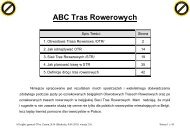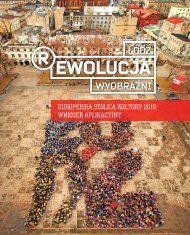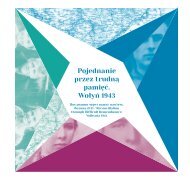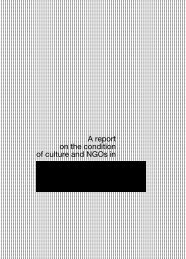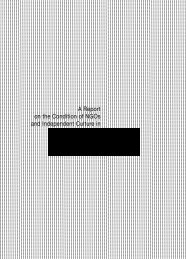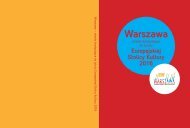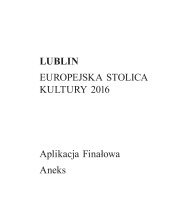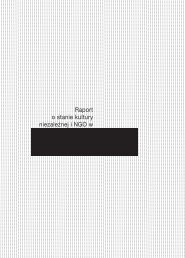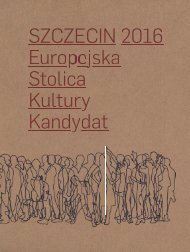Lublin 2016 â Appendix - Kultura Enter
Lublin 2016 â Appendix - Kultura Enter
Lublin 2016 â Appendix - Kultura Enter
Create successful ePaper yourself
Turn your PDF publications into a flip-book with our unique Google optimized e-Paper software.
2.2 Cultural education - this will cover not only school programmes, but also any forms of lifelong<br />
learning, projects, events and publications promoting cultural knowledge and intended for different<br />
age groups and environments, and aligned with their needs and capabilities. It is advisable<br />
that such measures are long-term. Also “involuntary” forms of education should not be neglected;<br />
they occur when individuals are exposed to culture in public spaces, in the voluntary work,<br />
during social and environmental projects (“learning by doing”).<br />
2.3 To include individuals and communities at risk of exclusion - this objective covers action taken<br />
for the galvanizing of the disabled, inhabitants of decayed districts, people living in confinement<br />
(hospitals, nursing homes, refugee centres, boarding houses, or prisons), impoverished individuals<br />
and families, and seniors, especially those suffering from the retirement crisis. It also<br />
serves the growing community of immigrants; for them, the combination of cultural, linguistic,<br />
mental and material barriers hider integration into the urban community life. Of key importance<br />
for this objective is the truth that participation in culture helps lift the barriers and limitations<br />
caused by age, health condition, nationality and ethnic tradition, material and social status; it promotes<br />
autonomy and self-reliance despite many hindrances; it promotes social inclusion and pursuit<br />
of creative solutions in life, particularly challenging when suffering from exclusion. For these<br />
reasons, it is pivotal that projects in this area are of long-term character, permitting the establishment<br />
of lasting social relationships.<br />
2.4 To support talented people aspiring to an artistic career - this objective addresses both talent<br />
search and talent forging and assisting in making an artistic début; this is particularly relevant for<br />
low-earning individuals or those experiencing other limitations.<br />
2.5 To develop competence in culture - intended for creators, culture operators and organizers of<br />
cultural life and enabling the experiencing of new solutions, trends and cultural phenomena, the<br />
establishing of artistic contacts and the broadening of the context of the <strong>Lublin</strong> culture to include<br />
the experience of other groups; it will also facilitate understanding for distinct cultural codes.<br />
2.6 To promote active lifestyle and participation in culture - this goal is seen as leading to well-being<br />
and getting out of the habit of passive leisure.<br />
2.7 To develop voluntary movement - as a form active participation in culture and social life; this<br />
form is crucial, since it serves as a civic “adjustment” or response to the established forms of activity,<br />
and is a tool in socializing and moulding civic attitudes. For the youth, students and seniors, it<br />
offers an opportunity for shared education and collaboration between generations and fraternities.<br />
Cultural Development<br />
Strategy<br />
3. Cultural offer,<br />
arranged thematically in the adopted programming axes (see above); it needs some tailoring to the needs<br />
and preferences of its participants, their lifestyles and capabilities. Due to the organisation of ECC<br />
<strong>2016</strong>, the 700th anniversary of city rights and the centenary of Poland’s independence, this offer this<br />
will be adequately extended in the years <strong>2016</strong>, 2017 and 2018. These three years that will see the climax<br />
of cultural events and are expected to entrench the position of the <strong>Lublin</strong>’s cultural offer.<br />
The operational objectives set out in this area are:<br />
3.1 To expand and improve the offer of local culture centres and community centres - this goal<br />
covers “first contact” culture centres scattered all over the city (Availability), whose objective should<br />
be to enable different groups (by age, interest) to take part in a broader encounter with “everyday”<br />
culture and cultural education, and promote social activity. This offer should be customized<br />
to the local needs, in line with the dynamics in the existing social situation. Their offer should<br />
balance the local needs, funding opportunities and management capacity. It is vital for such<br />
places to become real local centres, permanently integrating the local community. Also schools,<br />
libraries, or parishes may serve a similar function.<br />
79



